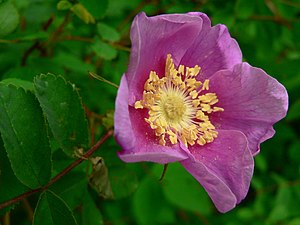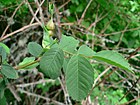Note: This is a project under development. The articles on this wiki are just being initiated and broadly incomplete. You can Help creating new pages.
Difference between revisions of "Rosa nutkana - Wild rose"
(→List of Ayurvedic medicine in which the herb is used) |
|||
| (3 intermediate revisions by 2 users not shown) | |||
| Line 1: | Line 1: | ||
[[File:Rosa nutkana 07513.JPG|thumb|right|''Rosa nutkana'', ''Nootka Rose'']] | [[File:Rosa nutkana 07513.JPG|thumb|right|''Rosa nutkana'', ''Nootka Rose'']] | ||
| − | + | '''Rosa nutkana''' is a 2–10 feet tall perennial shrub in the rose family Rosaceae. This plant is native to Western North America. | |
| − | '''Rosa nutkana''' is a 2–10 feet tall perennial shrub in the rose family | ||
| − | |||
==Uses== | ==Uses== | ||
{{Uses|Sore eyes}}, {{Uses|Labor pains}}, {{Uses|Bee stings}}, {{Uses|Women's complaints}}, {{Uses|Vomiting}}, {{Uses|Cancer}}, {{Uses|Diarrhea}}, {{Uses|Sore throats}} | {{Uses|Sore eyes}}, {{Uses|Labor pains}}, {{Uses|Bee stings}}, {{Uses|Women's complaints}}, {{Uses|Vomiting}}, {{Uses|Cancer}}, {{Uses|Diarrhea}}, {{Uses|Sore throats}} | ||
| Line 10: | Line 8: | ||
==Chemical Composition== | ==Chemical Composition== | ||
| − | The compounds quercetin, catechin gallate, quercetin-3-O-glucoside, 1,2,3,4,6-penta-O-galloyl-beta-D-glucoside, and 1,6-digalloyl-beta-D-glucoside exhibited weak antibacterial activity against MRSA<ref name="chemical composition"/> | + | The compounds quercetin, catechin gallate, quercetin-3-O-glucoside, 1,2,3,4,6-penta-O-galloyl-beta-D-glucoside, and 1,6-digalloyl-beta-D-glucoside exhibited weak antibacterial activity against MRSA.<ref name="chemical composition"/> |
==Common names== | ==Common names== | ||
| Line 53: | Line 51: | ||
==How to plant/cultivate== | ==How to plant/cultivate== | ||
| − | Succeeds in most soils, preferring a circumneutral soil and a sunny position<ref name="How to plant/cultivate"/> | + | Succeeds in most soils, preferring a circumneutral soil and a sunny position.<ref name="How to plant/cultivate"/> |
==Commonly seen growing in areas== | ==Commonly seen growing in areas== | ||
| Line 64: | Line 62: | ||
Rosa nutkana 07513.JPG | Rosa nutkana 07513.JPG | ||
Rosa nutkana near Squilchuck State Park Chelan County Washington.jpg | Rosa nutkana near Squilchuck State Park Chelan County Washington.jpg | ||
| − | |||
Bee (23470147929).jpg | Bee (23470147929).jpg | ||
Glacier flora8.jpg | Glacier flora8.jpg | ||
| Line 73: | Line 70: | ||
<references> | <references> | ||
| − | <ref name="chemical composition">[https://www.ncbi.nlm.nih.gov/pubmed/18066132 | + | <ref name="chemical composition">[https://www.ncbi.nlm.nih.gov/pubmed/18066132 Chemical constituents]</ref> |
| − | <ref name="Leaf">[http://nativeplantspnw.com/nootka-rose-rosa-nutkana/ | + | <ref name="Leaf">[http://nativeplantspnw.com/nootka-rose-rosa-nutkana/ Diagnostic character]</ref> |
| − | <ref name="How to plant/cultivate">[https://www.pfaf.org/user/Plant.aspx?LatinName=Rosa+nutkana | + | <ref name="How to plant/cultivate">[https://www.pfaf.org/user/Plant.aspx?LatinName=Rosa+nutkana Cultivation details]</ref> |
</references> | </references> | ||
| Line 87: | Line 84: | ||
[[Category:Herbs]] | [[Category:Herbs]] | ||
| + | [[Category:Rosaceae]] | ||
Latest revision as of 19:34, 30 July 2020
Rosa nutkana is a 2–10 feet tall perennial shrub in the rose family Rosaceae. This plant is native to Western North America.
Contents
- 1 Uses
- 2 Parts Used
- 3 Chemical Composition
- 4 Common names
- 5 Properties
- 6 Habit
- 7 Identification
- 8 List of Ayurvedic medicine in which the herb is used
- 9 Where to get the saplings
- 10 Mode of Propagation
- 11 How to plant/cultivate
- 12 Commonly seen growing in areas
- 13 Photo Gallery
- 14 References
- 15 External Links
Uses
Sore eyes, Labor pains, Bee stings, Women's complaints, Vomiting, Cancer, Diarrhea, Sore throats
Parts Used
Chemical Composition
The compounds quercetin, catechin gallate, quercetin-3-O-glucoside, 1,2,3,4,6-penta-O-galloyl-beta-D-glucoside, and 1,6-digalloyl-beta-D-glucoside exhibited weak antibacterial activity against MRSA.[1]
Common names
| Language | Common name |
|---|---|
| Kannada | |
| Hindi | |
| Malayalam | |
| Tamil | |
| Telugu | |
| Marathi | NA |
| Gujarathi | NA |
| Punjabi | NA |
| Kashmiri | NA |
| Sanskrit | |
| English | Dublin Bay, Impatient |
Properties
Reference: Dravya - Substance, Rasa - Taste, Guna - Qualities, Veerya - Potency, Vipaka - Post-digesion effect, Karma - Pharmacological activity, Prabhava - Therepeutics.
Dravya
Rasa
Tikta (Bitter), Kashaya (Astringent), Madhura(Sweet)
Guna
Laghu (Light), Snigda (Slimy)
Veerya
Sheeta (cold)
Vipaka
Madhura(Sweet)
Karma
Kapha, Vata, Pitta
Prabhava
Habit
Identification
Leaf
| Kind | Shape | Feature |
|---|---|---|
| Pinnate | Leaves have 5-7 toothed leaflets, sometimes glandular, with more or less rounded tips | {{{3}}} |
Flower
| Type | Size | Color and composition | Stamen | More information |
|---|---|---|---|---|
| Unisexual | 2-4cm long | Pink | 5-20 | Nootka Rose has larger flowers that are usually borne singly |
Fruit
| Type | Size | Mass | Appearance | Seeds | More information |
|---|---|---|---|---|---|
| 1-2cm | Fruits are purplish-red hips | {{{6}}} |
Other features
List of Ayurvedic medicine in which the herb is used
Where to get the saplings
Mode of Propagation
How to plant/cultivate
Succeeds in most soils, preferring a circumneutral soil and a sunny position.[3]
Commonly seen growing in areas
Woods and open place area, Moderate elevations.
Photo Gallery
References
External Links
- Ayurvedic Herbs known to be helpful to treat Sore eyes
- Ayurvedic Herbs known to be helpful to treat Labor pains
- Ayurvedic Herbs known to be helpful to treat Bee stings
- Ayurvedic Herbs known to be helpful to treat Women's complaints
- Ayurvedic Herbs known to be helpful to treat Vomiting
- Ayurvedic Herbs known to be helpful to treat Cancer
- Ayurvedic Herbs known to be helpful to treat Diarrhea
- Ayurvedic Herbs known to be helpful to treat Sore throats
- Herbs with Dried flowers used in medicine
- Herbs with common name in English
- Habit - Shrub
- Index of Plants which can be propagated by Seeds
- Index of Plants which can be propagated by Cuttings
- Herbs that are commonly seen in the region of Woods and open place area
- Herbs that are commonly seen in the region of Moderate elevations
- Herbs
- Rosaceae







